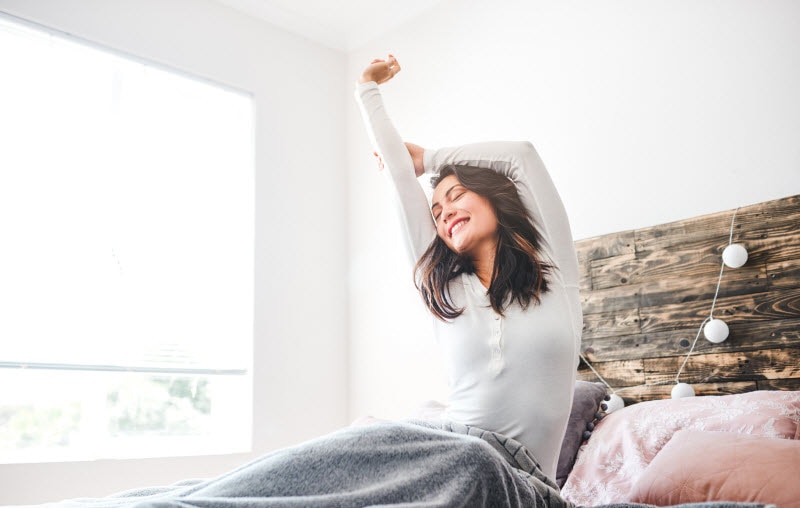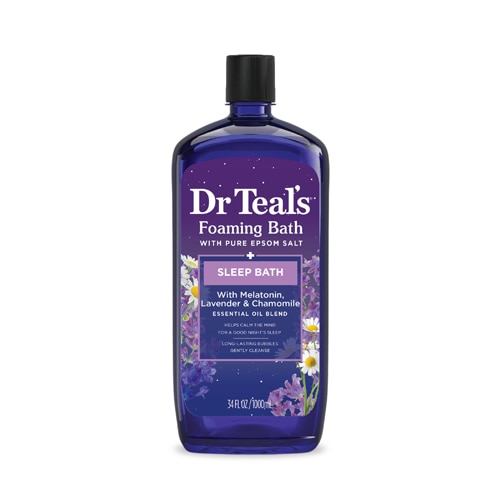Having trouble sleeping? If the answer is yes, you're probably not surprised to learn that you're not alone. According to
an article published in Neurology Today, sleep neurologists, neurologists who specialize in sleep disorders, report a surge in sleep disorders associated with the stress, fear, isolation and uncertainty caused by the
pandemic.

Sadly, poor sleep was an issue for many adults before the pandemic. According to the
American Sleep Association, about 30% of Americans experience short-term insomnia, and 10% have chronic insomnia. Additionally, more than 35% of adults don't get the recommended seven hours of sleep a night.
For many who had gotten their sleep issues under control, their condition is returning. Then, there's a whole host of new adults and, unfortunately, children and teens, who are succumbing to sleep issues as their lives are on hold, in disarray or falling apart.
"People are worried, apprehensive and anxious," says Alon Y. Avidan, MD, MPH, FAAN, professor and vice-chair in the department of neurology at the David Geffen School of Medicine at UCLA, and director of the UCLA Sleep Disorders Center, who's seen a dramatic increase in patients complaining of Insomnia. "What we're seeing is the pandemic is exacerbating those previously well-controlled patients."
Schedules are disrupted with people working from home, not leaving their houses, and not getting early morning sunlight or, in some cases, any natural light. People are checking the news obsessively throughout the day, including at night before bed. They're riddled with worry about themselves, their families, and their loved ones. Children are stuck at home all day, isolated and surrounded by anxious parents. It's a perfect storm of circumstances that make a good night's sleep hard to attain for anyone – young or old.
To compound the issue,
lack of sleep can mean lower immunity and increased susceptibility to colds, flu and viruses. Conversely, a good night's sleep can help you fight stress, boost energy, improve mental health and build a strong immune system.
Should you try a sleep aid?
In other words, sleep is essential for your well-being, now more than ever. To help get a good night's sleep, many people are reaching for
sleep aids. A
study done at the very early stages of the pandemic already reported a 14.8% increase in prescriptions filled between February 15 and March 15, 2020.
Dr. Avidan says he sees most people pulling something off the pharmacy or supermarket shelf, such as Benadryl, which has a sedating effect. "The problem is that it's sedating at night but also during the day," he says. And when it comes to natural sleep aids, he says there is not enough data to show they're safe and effective.
"A sleep aid is what people are searching for because it's easy to get and gives them a safety blanket: you take a drug, and you fall asleep. It's how we treat pain and constipation. But Insomnia is complex. There's a significant behavioral component that has to be addressed," he says.
Dr. Avidan is an advocate of behavioral and cognitive therapy when it comes to Insomnia and chronic Insomnia to help address the root cause of anxiety and sleeplessness. "Insomnia is pervasive and difficult to control. People are searching for something that's accessible, that works right away with the expectation that when they wake in the morning, they'll be alert and ready to go – that the drug will be out of their system. There is no drug that does this."
For those who don't have the resources or access to behavioral therapy, he offers the following recommendations for those looking for proven methods to help them sleep soundly.
Tips for How to Sleep Better
1. Lower the temperature in your bedroom
The National Sleep Foundation recommends setting your thermometer between 60 and 67 degrees Fahrenheit. Dr. Avidon says to go all the way down to 60 F. While this might sound unbearable to some, he explains that a drop in temperature promotes melatonin release, which is part of the natural sleep cycle.
Our bodies' temperature drops slightly at bedtime, so helping our bodies get to that lower temperature by setting the thermostat at 60, or opening a window if possible, helps set things in motion for sleep.
2. Exercise in the morning or early afternoon
There are numerous
benefits to regular exercise, including improved mood, weight loss and reduced heart disease risk. You can add better sleep to that list. Although scientists can't pinpoint why exercise helps you fall asleep more quickly and soundly, there is research to show that exercise is an effective non-medication treatment for poor sleep.
However, the time of day you exercise is important. Exercising too close to bedtime can raise your body temperature and boost endorphins, which can disrupt your sleep cycle. Exercising in the morning or early afternoon leaves your body enough time to reap the benefits of an endorphin boost and stress relief while giving your body enough time to cool down and relax later in the evening.
3. Get sunlight between 7 a.m. and 9 a.m.
One problem that people are facing with the pandemic is that they aren't getting outside in the morning to go to work or school because classes and meetings are on zoom, and they're working from home. Dr. Avidon explains that your circadian clock, the internal clock that regulates your sleep-wake cycles, is primed to receive light in the morning, between 7 a.m. and no later than 9 a.m.
Disrupting your circadian clock, which can happen when you cross time zones or go to bed later and sleep in or don't get exposed to light in the morning and darkness in the evening, can lead to insomnia and poor sleep. "Without light exposure, we lose the signal for sleep-wake patterns," cautions Dr. Avidan.
Melatonin supplements, he says, can help correct circadian rhythm abnormalities.
†
3. Avoid these foods and beverages
What you eat and drink can impact your sleep. Too little food before bed can leave you hungry, making it difficult to sleep, and too large of a meal, especially a spicy one can leave you uncomfortable and lying awake. While alcohol, which people are consuming in greater quantities during the pandemic, can help you relax and fall asleep, it often wears off, causing you to wake in the middle of the night and leave you unrested the next day.
You probably know about caffeine's stimulating effect, but you may not realize how many food and over-the-counter medications contain. Be wary about what you consume in the late afternoon and nighttime. The one drink that studies, albeit limited ones, show can induce sleep is
tart cherry juice, says Dr. Avidan.
†
4. Think of the bed as a place to sleep only
With more people working from home, bedrooms have turned into makeshift offices with beds becoming "conference rooms" or work areas. Additionally, people are obsessively scrolling through news and social media late into the night while in bed. It's easy to see how this can impact sleep.
"Reading or watching the news at night is common; people are just trying to get information. But, they're getting information at the wrong time. [Getting news at night] builds anxiety and insecurity," says Dr. Avidan. "Fortunately, it's an area that you can intervene. Get your news early in the day, and don't look at your phone or TV late at night." Additionally, he advises designating your bed as a place for sleep only.
5. Relaxation techniques
Relaxation techniques such as mediation and deep breathing exercises can help relax your body and mind. If you can stop the thought cycles that interfere with your sleep through simple breathing exercises, you should be able to fall asleep more quickly and stay asleep through the night.
Basic sleep hygiene recommendations such as going to bed and waking close to the same time every day and making sure your room is dark and quiet and night can also help. Sleep is an important part of your overall health. If your daytime and nighttime routines are interfering with sleep, you need to change them. "The approach is not that you do one thing and only one thing. You do everything," Dr. Avidan recommends.
†These statements have not been approved by the Food and Drug Administration. These products are not intended to diagnose, treat, cure or prevent disease.
 Sadly, poor sleep was an issue for many adults before the pandemic. According to the American Sleep Association, about 30% of Americans experience short-term insomnia, and 10% have chronic insomnia. Additionally, more than 35% of adults don't get the recommended seven hours of sleep a night.
For many who had gotten their sleep issues under control, their condition is returning. Then, there's a whole host of new adults and, unfortunately, children and teens, who are succumbing to sleep issues as their lives are on hold, in disarray or falling apart.
"People are worried, apprehensive and anxious," says Alon Y. Avidan, MD, MPH, FAAN, professor and vice-chair in the department of neurology at the David Geffen School of Medicine at UCLA, and director of the UCLA Sleep Disorders Center, who's seen a dramatic increase in patients complaining of Insomnia. "What we're seeing is the pandemic is exacerbating those previously well-controlled patients."
Schedules are disrupted with people working from home, not leaving their houses, and not getting early morning sunlight or, in some cases, any natural light. People are checking the news obsessively throughout the day, including at night before bed. They're riddled with worry about themselves, their families, and their loved ones. Children are stuck at home all day, isolated and surrounded by anxious parents. It's a perfect storm of circumstances that make a good night's sleep hard to attain for anyone – young or old.
To compound the issue, lack of sleep can mean lower immunity and increased susceptibility to colds, flu and viruses. Conversely, a good night's sleep can help you fight stress, boost energy, improve mental health and build a strong immune system.
Sadly, poor sleep was an issue for many adults before the pandemic. According to the American Sleep Association, about 30% of Americans experience short-term insomnia, and 10% have chronic insomnia. Additionally, more than 35% of adults don't get the recommended seven hours of sleep a night.
For many who had gotten their sleep issues under control, their condition is returning. Then, there's a whole host of new adults and, unfortunately, children and teens, who are succumbing to sleep issues as their lives are on hold, in disarray or falling apart.
"People are worried, apprehensive and anxious," says Alon Y. Avidan, MD, MPH, FAAN, professor and vice-chair in the department of neurology at the David Geffen School of Medicine at UCLA, and director of the UCLA Sleep Disorders Center, who's seen a dramatic increase in patients complaining of Insomnia. "What we're seeing is the pandemic is exacerbating those previously well-controlled patients."
Schedules are disrupted with people working from home, not leaving their houses, and not getting early morning sunlight or, in some cases, any natural light. People are checking the news obsessively throughout the day, including at night before bed. They're riddled with worry about themselves, their families, and their loved ones. Children are stuck at home all day, isolated and surrounded by anxious parents. It's a perfect storm of circumstances that make a good night's sleep hard to attain for anyone – young or old.
To compound the issue, lack of sleep can mean lower immunity and increased susceptibility to colds, flu and viruses. Conversely, a good night's sleep can help you fight stress, boost energy, improve mental health and build a strong immune system.



